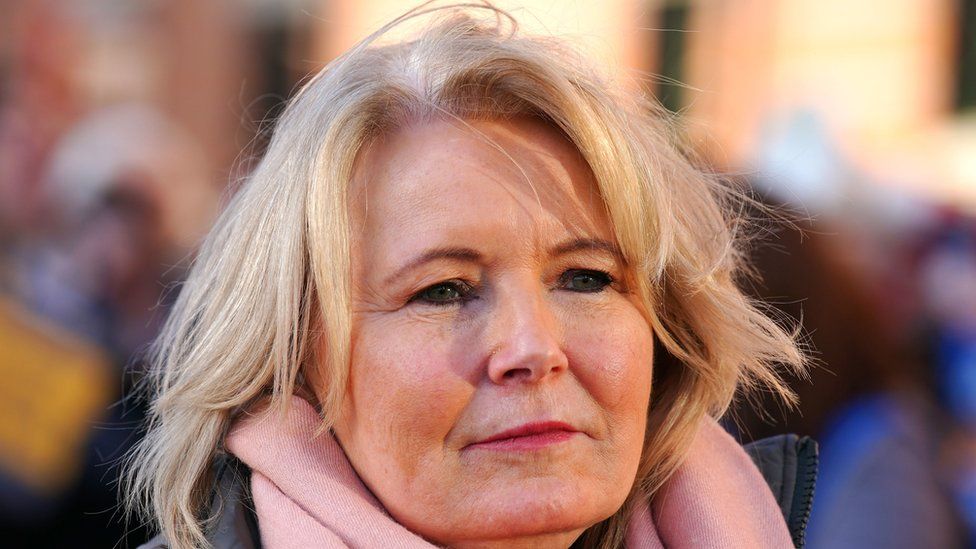ARTICLE AD BOX
 Image source, PA Media
Image source, PA Media
Pat Cullen has led the largest strike action in the history of UK nursing
By Jasmine Andersson
BBC News
It may be surprising to hear Pat Cullen struck a tone of sorrow, not anger, as she led English and Welsh nurses into the first nationwide strike in the nursing union's 106-year history.
Speaking on the first day of the walkouts, the general secretary of the Royal College of Nursing called it "a tragic day for nursing, and a tragic day for patients".
The union chief's sombre approach appears to have resonated somewhat with the public. While many feared for patients as the NHS weathered two days without nurses delivering any non-emergency care, two-thirds of people say they support the profession's campaign for better pay and working conditions, according to the latest YouGov poll this week.
As the top official for the RCN, Ms Cullen represents over 465,000 registered nurses, midwives, healthcare assistants and nursing students. Around 300,000 of these are nurses, representing two-thirds of the profession.
At a time of deep crisis for the NHS, she is tasked with fighting for the welfare and rights of staff while also keeping in check with the frustrations of patients facing spiralling waiting lists, treatment delays and a shortage of resources.
But Ms Cullen, as she has described herself, is tenacious. She successfully spearheaded strike action in her home nation of Northern Ireland in 2019 to get better pay for nurses. That too was Northern Ireland's first ever nationwide nursing strike.
Ms Cullen, a former psychiatric nurse turned RCN general secretary, has previously said nursing was "in her blood".
The 58-year-old grew up in Carrickmore in County Tyrone, born to farmer Paddy McAleer and his wife, Annie. She was the youngest of seven siblings, with six sisters and one brother.
Ms Cullen says she was inspired into the profession by her eldest sister, who would come home in a "beautiful uniform", talking passionately about her last shift.
"I remember thinking, even at that young age, it was just incredible how much she was able to touch people's lives," she told the Guardian earlier this month.
Ms Cullen did not pass her GCSEs so did not stay on for A-Levels and instead decided on nursing college in Carrickmore, a time she recalled to the Belfast Telegraph as her "really happy years".
The RCN chief was drawn to mental health nursing in particular after watching her mother take care of one of her sisters, who has learning disabilities.
Working as a community psychiatric nurse during the height of the Troubles, Ms Cullen recalled the impact of the violence on mental health being "shocking".
It was during her time as an 18-year-old trainee in County Antrim that she started calling out what she saw as injustices in the system.
She wrote to hospital management over a "heartless policy" which punished patients whose behaviour proved difficult by taking away their personal possessions like sweets or cigarettes.
"I just felt that was such an injustice. Patients on the wards couldn't cope without their own personal belongings," she told the Guardian. "I think I did win it; I felt great about it."
Royal College of Nursing leader Pat Cullen: "My door is open"
Following her work on the front line, Ms Cullen worked as the professional head of nursing in a local healthcare trust, before joining the Department of Health as a nursing officer in 2001.
Her husband of 30 years - Enda - also works in healthcare as a GP in south Belfast. Despite her best efforts, her two children are not in the nursing profession, but her son Shane is training to be a surgeon in Dublin.
It was in 2019, the year she was appointed the Royal College of Nursing's Northern Ireland director, that she was confronted with what she described as "an injustice too far".
Nurses' pay in Northern Ireland had fallen to 10 years behind anywhere else in the UK, compelling her to campaign for strike action, the first in the union's history.
A three-day strike led to Stormont striking a deal with the RCN, leading to the introduction of better pay, and legislation on safe staffing levels.
Now, Ms Cullen is leading a similar battle for nurses in England and Wales. She was appointed the RCN's interim general secretary and chief executive in July 2021, initially for a period of 18 months.
While the RCN and the government have held talks, Ms Cullen has insisted that everything has been on the table - apart from discussions on pay.
In the face of the strikes, Health Secretary Steve Barclay has said that the RCN's requests for a 19% pay rise was "unaffordable" during a cost-of-living crisis, but has said his door is "always open" to continue talks. He emphasised the pay offer was based it on recommendations by an independent pay review body.
With the union and the government in a stalemate, Ms Cullen has warned that there may be further action to come in 2023.
And in her own words, she describes herself as someone who will follow through on something she believes in "to the bitter end".
"I'm hardworking," she told the Guardian. 2I have a really wicked sense of humour. That gets me through. And I'm tenacious. I'm definitely tenacious. When I believe in something I'll follow it through to the bitter end, I absolutely will."
Image source, PA Media
Image caption,Pat Cullen joins nurses on the picket line during the 15 December strike

 2 years ago
37
2 years ago
37








 English (US) ·
English (US) ·